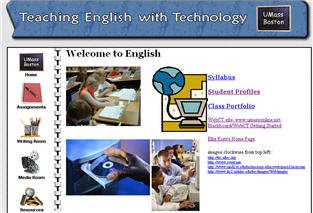As interesting as I thought this article was, it left me questioning, if we don't incorporate technology into our classrooms are we producing non-literate students by today's standards of literacy? They noted that "the children who have entered the school since 1990 are being shaped within a world that is not dominated by print in a way that their teachers' and parents' world was" (546). These statistics represent our children and as technologically aware (I won't say savvy) as this twenty-eight-year-old is, I can't compete with the amount of exposure that my students have had. Yet, many times I see that as their downfall. I think that technology brings with it such a rush for things right here, right now. Everything is immediate, including the amount of information that the students get via the internet. In their article they mention that children's literature can't be limited to printed texts, a statement that I completely disagree with (548). There needs to be a base from where literacy is taught. I continue to voice my opinion about the necessity of balance, but even more so when it comes to the younger students. Students need to know the basics, they need to understand printed text before they can fully understand and follow hypertext. In their article, they later talk about the necessity to be able to follow hypertext you need to rely on your linear reading ability (552). How can you develop this ability without first learning to simply read linearly? Even the argument for hypertext, although beneficial in further exploring information, is a tool that begins with basic skills and expands on them. How can you expand on information if you don't have the initial information to begin with? I agree that to produce literate students we need to incorporate technological literacy in our curriculum, but to base their literacy around this median, in my opinion, is dangerous. It creates a constant reliance on technology. The idea of hypertext reminded me of those books when I was a kid that gave you the opportunity to choose the endings. There were multiple endings you could choose for each chapter and depending on what you chose it would lead you to a different ending. It gave you choice and made you feel like you had a say in what happened in the story. Yet, a child that didn't have the ability to foreshadow or even create meaning out what they had previously read, wouldn't be able to understand the concept or the uniqueness of the opportunity that type of book offered - all of which are reading skills that are developed and are considered good reading strategies. I don't believe that you can process information the same online or through a screen as you can in printed text.
"Technology is a clear presence in our schools and in our nation" (546). They talk about the access that schools have to technology in this day and age, but our class suggests that although we all have access to technology and use it to email, receive and respond to memos and parents, create documents to use in class, record our grades, etc., does this count as using technology in our classes? Obviously the answer is no. Kinzer and Leander, alond with Kajder, provide ideas as to how to include technology successfully into our curriculum. But my arguemnt is that to say that by not providing our students with these technological aspects is creating illiterate students screams "WE'RE FAILING!" to me. So many of us in this class, and in classrooms in general, work hard to provide our students with a clear understanding of what literature, composition, and communication in general are that to say that not including technology is doing such a great disservice to them bothers me. I agree that more technology needs to be included in the classroom but to take the weight away from the understanding and working with printed text will be doing an even greater disservice. I think we all agree that our students our technologically capable and that helping them grow in those skills is something we all welcome, yet not at the expense of relinquishing the gift of composing an essay or debating a text that can make an individual or a class grow both intellectually and personally.
Course homepage

Course homepage
Subscribe to:
Post Comments (Atom)
3 comments:
Ali --
I find your comments here passionate. And you're right -- if we drive too fast with this technology stuff, do we begin to lose sight of what is fundamentally important?
I also wonder about who's job it is to teach them about the internet. Sure, it is another form of literacy, so maybe English teachers? But what do you replace in the curriculum then? It seems to me that if you want the students to do something with this, it has to be a more concentrated effort than just suggesting to teachers that they integrate technology. Perhaps elective or required courses with technology, with technology teachers, is more the way to go.
I know in my school, the media specialist (a.k.a. the librarian) does do an introductory course to the library and proper internet usage...however, I am now wondering if she does any more. I feel as though she may, and I may not be taking full advantage of her as a resource. It's already hard enough for me to cram in all of the texts that are in the curriculum, nevermind prepare my students for the MCAS, I may sound lazy, but I really don't want to have to add to my courseload.
Post a Comment